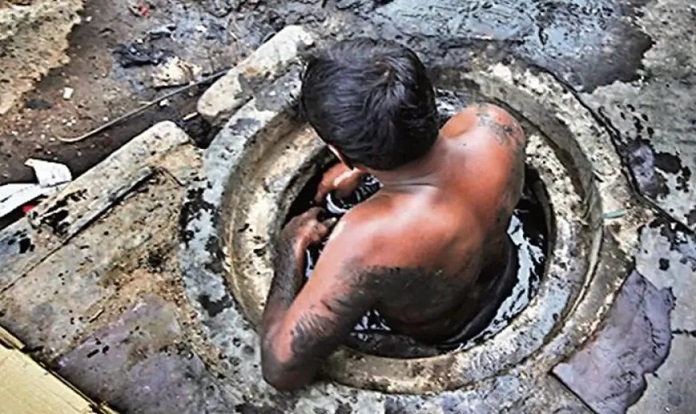Last Updated on November 20, 2024 4:35 pm by INDIAN AWAAZ

Staff Reporter / New Delhi
The safai Karmacharis (cleaning Worker) are made to risk life under the ground in sewer lines and septic tanks to toxic gases and asphyxiation. Now, with the current dangerous air pollution levels, their lives are at risk above the ground also.
The AQI and the toxic levels of the air pollution are far above any safety standards and is nothing short of a medical emergency. An AQI above 400 is hazardous, impacting even healthy individuals and posing serious risks to those with existing health condition. Safai Karmacharis have preexisting vulnerable respiratory and gastro-intestinal health conditions due to their constant exposure to dirt and faeces. Now, this exposure to such extreme toxic levels of air is a serious risk to life. The large number of women safai Karmacharis who are menstruating, pregnant, lactating, anaemic and menopausal, are risking life and health while they work in the open.
The Air pollution in Delhi has breached dangerous levels with AQI above the “severe Plus” category of 480 +. Restrictions under GRAP Stage IV have been put in Delhi-NCR region and many other cities are taking steps to tackle the situation. Educational institutions are closed, traffic movements are controlled, office attendance are regulated and many activities are restricted. The Delhi Government has ‘ordered’ 50% of its employees to work from home. The governments of the pollution affected cities are taking all measures to protect their employees. However, the governments are negligent and uncaring about the safai Karmacharis. They remain excluded and untouched by these protection measures. They continue to work the usual working hours, invisible and untouched, out in the open, engulfed and submerged by the dust, smog and pollution. Safai Karmachari Andolan reiterates that safai Karmacharis are essential workers and they should be treated on par—in status and allowances—with emergency workers in other sectors. Sanitation work falls under the hazardous work category. Precautions and norms as prescribed by WHO for such workers, should be mandatorily followed.
Safai Karmachari Andolan demands
1. The GRAP Stage IV restrictions for the current crisis of air pollution must include explicit
regulations for the working conditions of safai Karmacharis with reduced, flexible and alternate
working conditions.
2. The governments must cover all medical care and treatment expenses of the safai Karmacharis.
3. The safai Karmacharis must be entitled to paid sick leave till they are able to resume their duties.
4. The governments must ensure mandatory weekly health check for all safai Karmacharis to ascertain that they are fit to work. if they are not fit they must be given all assistance including wages and health care during this period.
The safai Karmacharis are already worst affected by the caste system and its institutions of inequality and untouchability created by an invisible notion and stigma of pollution. Now, the safai Karmacharis are again the worst affected by this visible pollution in the air. The governments must take proactive steps to protect the life, the health and dignity of sanitation workers in letter and in spirit.
